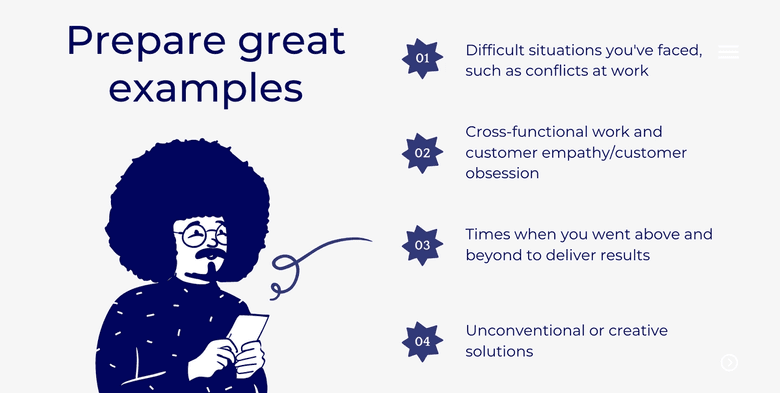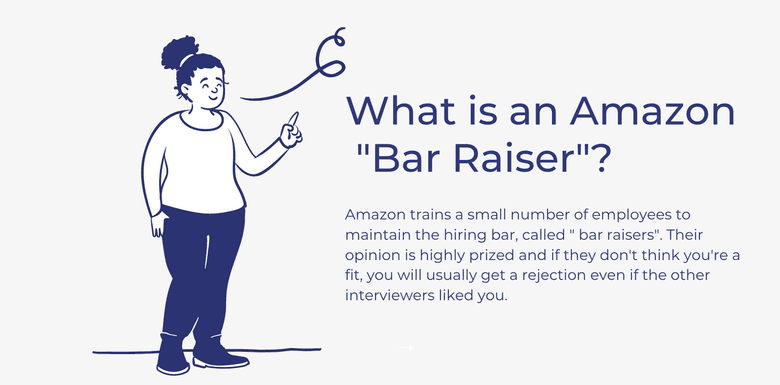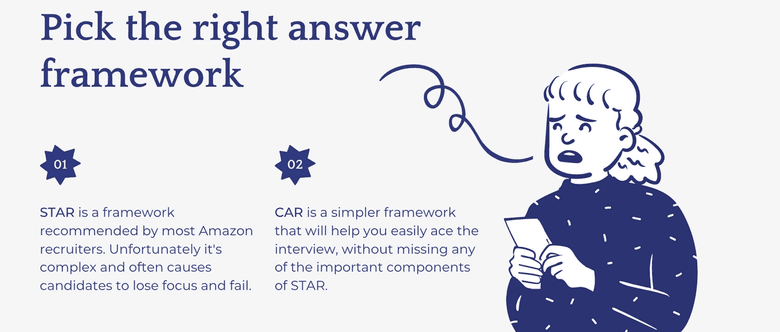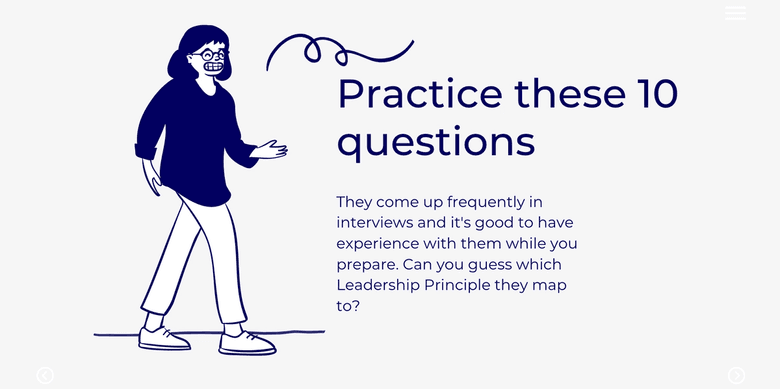How to answer Amazon behavioral interview questions correctly
How to expertly answer Amazon behavioral questions.

One of the key ways that Amazon interviews differ from other FAANGs (like Google), is how they approach behavioral questions.
Namely, they are modeled after the 14 Leadership Principles pioneered by Jeff Bezos, that Amazon holds dear. These principles, and the questions associated with them, are designed to dive deep into your professional background and how you handle workplace situations. Amazon views this as an area that's just as important as how you deal with technical questions so make sure you're ready with some good answers.
👉 Practice Amazon behavioral interview questions here.
Interview Process Structure
There are 5 total parts in the Amazon interview loop (more on that here) and behavioral interview questions are part of every single one.
No matter what you do to prep- spend the lion share of your effort preparing for this section.
During the behavioral interview, you will often be asked questions that start with "Tell me about a time when..." or "When was the last time that...". Amazon has designed the process to focus on you giving real examples of a time that you've experienced something at work.
To ace this section, you need to work on your stories. Be sure to have specific examples of:

- Difficult situations you've faced, such as conflicts at work
- Crossfunctional work and customer empathy/customer obsession
- Times when you went above and beyond to deliver results
- Unconventional or creative solutions
Do the Leadership Principles matter?
Yes, more than you think. Depending on your role and level of seniority, you will be asked different Leadership Principles - they're all behavioral questions but knowing the principles and being able to use the correct example for each one will make or break your interview.
Take a moment to review all 14 of them:
- Customer Obsession
- Ownership
- Invent & Simplify
- Are Right, A lot
- Learn and Be Cautious
- Hire and Develop the Best
- Insist on the Highest Standards
- Think Big
- Bias for Action
- Frugality
- Earn Trust
- Dive Deep
- Have Backbone; Disagree & Commit
- Deliver Results
Have you heard about "the bar raiser"?

They will ask you behavioral questions too - but dive much deeper into your answers.
A bar raiser is an Amazon employee trained to be an interview expert. They serve as an objective mediator for hiring decisions outside their department to ensure a fair decision-making process. Their job is to determine whether or not you would “raise the bar” on performance or simply perpetuate the status quo -- a concept borrowed from Microsoft’s hiring methods.
You may not know who the bar raiser is, however, one important clue is they will emphasize behavioral questions regarding Amazon’s leadership principles. They are also typically the last person you interview with onsite.
The bar raiser will pay special attention to the following:
- What questions is the candidate asking?
- Do they see the bigger picture of their role or the product they’ll be working on?
- Do they care about how their role impacts the company?
- Do they show empathy for the user?
Secrets to Answering Right

Many recruiters will recommend you use the STAR method to tackle the Amazon leadership principles based questions. This is what Amazon hiring managers (and even Jeff Bezos!) expect and one of the top interview tips given for the onsite interview. This method is just a framework to help you stay organized, but I view it as overly- complex:
(1) SITUATION/TASK
Describe the situation/task you faced and the context of the story. This should answer the Where/When/Why. (Where did this occur; When did it happen; Why is it important).
(2) ACTION
Describe the actions that you took. Answering the What/How/Who. (What did you personally do; How did you do it; Who else was involved).
(3) RESULT
Describe the results you achieved. Answering how you measure this success. It is important to note that specific results ($, #, %, time) are better received answers.
I do not recommend you use the STAR method.
I recommend a different framework called CAR:
Context is about describing a situation and setting the scene for a relevant example from your past. The key here is to choose your example well – one that clearly demonstrates the quality or skill the employer is asking about.
Action is about explaining what action you took. Be really specific rather than making vague statements and outline your steps and rationale.
Result is about detailing the outcome of your action. Offer specific facts relating to the result. For instance, quote figures and statistics, or feedback from your manager, that back up your assertion.
Interview Question Examples

Click here to learn about the Amazon Interview Prep Course (it includes sample answers to all 14 LPs)
First, start by reading your job description carefully. You can usually predict which of Amazon's leadership principles will be most applicable to your role. And, of course, get ready to answer the baseline question "Why amazon?"
Past that, here are some Amazon interview questions you can start prepping for:
- Tell me about a time when you were faced with a problem that had a number of possible solutions.
- When did you take a risk, make a mistake, or fail? How did you respond, and how did you grow from that experience?
- Describe a time you took the lead on a project.
- What did you do when you needed to motivate a group of individuals or promote collaboration on a particular project?
- How have you leveraged data to develop a strategy?
- Tell me a challenge you had where the best way forward was not clear-cut. How did you decide what to do?
- Amazon is a peculiar company. What is peculiar about you?
- Would you oppose a supervisor who made a decision that goes against corporate policy and is a potential safety issue for one of your employees?
- Tell me about a time when you delegated a project effectively.
- Tell me about a time when you coached someone.
What if I don't have good answers?
You can use a personal situation to answer a question, not every story has to be work-related. But try to limit these, since Amazon likes to dive deep into your work experience to get more context on how you make decisions. You should have an example wither way - it's not a good idea to skip a question in this interview.
Ideally, tailor your examples to a specific leadership principle that the team member can relate to.
You can find more questions and information about the Amazon process here. Once you go through the interview, get ready to discuss your offer with your recruiter.
What other questions might I get?
For a software engineering role, be prepared to answer technical questions about algorithms, data structures and coding. Have a notebook, pen and laptop ready as you may be required to code on the fly.
For a product manager role, expect to work on a case and answer strategy questions.
This specialization applies to other roles too. Operations roles usually involve a deeper discussion of your resume. Designers should expect to go through your portfolio.
Depending on the role, you may be asked to provide or discuss examples of past work. If possible, hyperlink these samples in your resume (if you code, make sure your GitHub portfolio is ready for prime time).
You can find more questions and information about the Amazon process here. Once you go through the interview, get ready to discuss your offer with your recruiter.
The information provided herein is for general informational purposes only and is not intended to provide tax, legal, or investment advice and should not be construed as an offer to sell, a solicitation of an offer to buy, or a recommendation of any security by Candor, its employees and affiliates, or any third-party. Any expressions of opinion or assumptions are for illustrative purposes only and are subject to change without notice. Past performance is not a guarantee of future results and the opinions presented herein should not be viewed as an indicator of future performance. Investing in securities involves risk. Loss of principal is possible.
Third-party data has been obtained from sources we believe to be reliable; however, its accuracy, completeness, or reliability cannot be guaranteed. Candor does not receive compensation to promote or discuss any particular Company; however, Candor, its employees and affiliates, and/or its clients may hold positions in securities of the Companies discussed.
